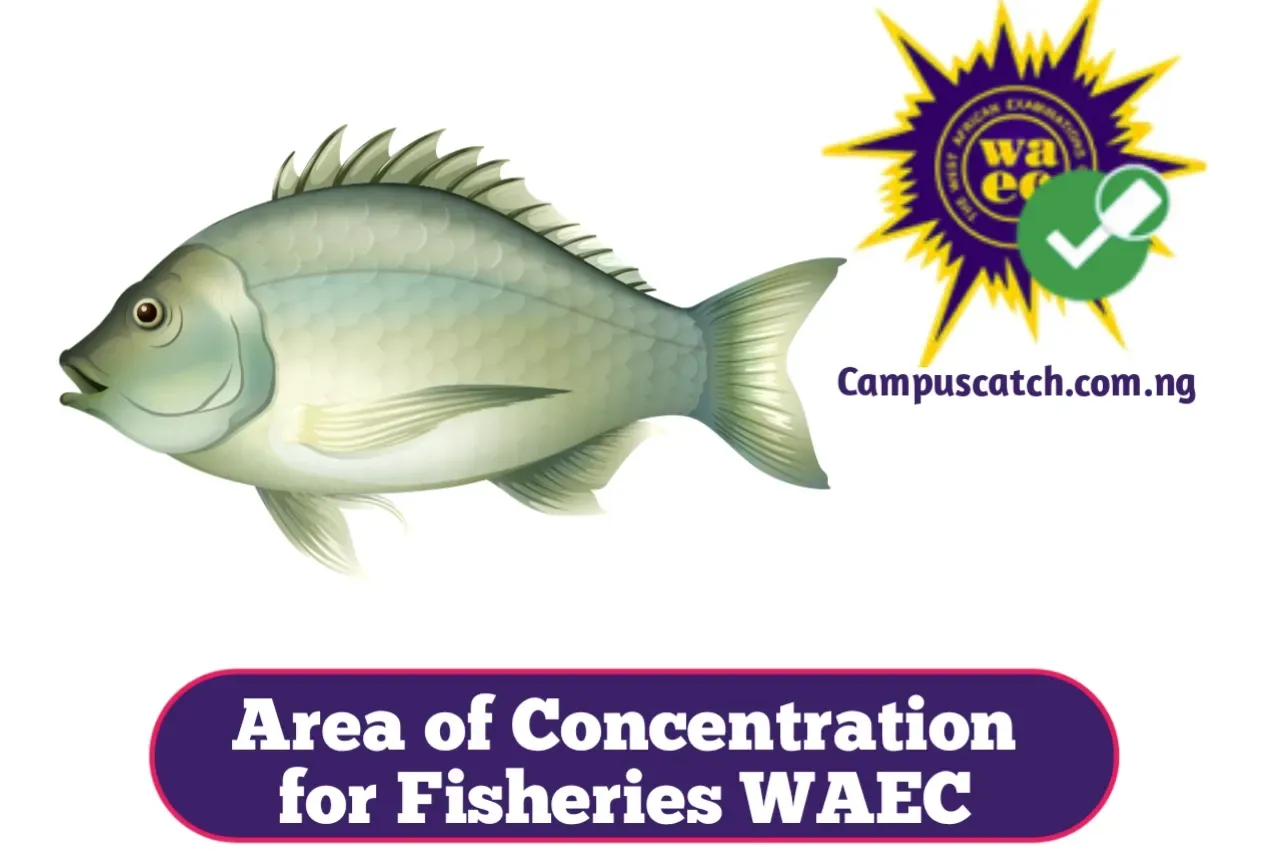Are you writing the upcoming waec 2024 exam and fall here searching for the Area of Concentration for fisheries WAEC 2024, waec fishery syllabus 2024 and etc.
In this page, we have provided you with the Area of Concentration for fisheries WAEC 2024 to assist you in preparing for the upcoming waec ssce examination.
With out wasting much time, let's dive in.
Area of Concentration for Fisheries WAEC 2024
INTRODUCTION TO FISHERIES
1. Fisheries and national development
(a) Meaning of fisheries
(b) Types of fisheries
(c) Importance of fisheries to
national development.
2. Fishery organisms and their habitats
(a) Identification and description of common fishery organisms
(b) Fishery habitats.
(c) Identification and description of the characteristics of invasive alien species in fishery habitats
(d) Effects of invasive alien species in fisheries
(e) Prevention and control of invasive alien species in fishery habitats
3. Grouping of fishery organisms
FISHING ACTIVITIES
1. Fish landing sites and facilities
(a) Types of fish landing sites
(b) Facilities and activities at fish landing sites
(c) Sanitation practices at fish landing sites
2. Fishing gear and craft.
(a) Classification and description of fishing gear
(b) Construction and maintenance of fishing gear
(c) Description and maintenance of fishing craft.
(d) Fishing methods
(e) Harmful fishing practices
FISH BIOLOGY
1. Identification and classification of fishery organisms
(a) Identification of common fishery organisms by species
(b) Classification of common fishery organisms
2. Structure and function of fishery organisms
(a) Fish body measurements
(b) External structures and features of fishery organisms
(c) Internal organs of bony fishes and their functions
3. Life processes in fishes
(a) Locomotion
(b) Feeding and digestion
(c) Blood circulation
(d) Gaseous exchange
(e) Excretion
(f) Reproduction
(g) Growth
4. Fish ecology
(a) Environmental conditions in fish habitats
(b) Ecological processes within fish habitats
(c) Pollution in water bodies
5. Fish genetics and evolution
(a) Principles of Genetics
(b) Inheritance of genetic characteristics
AQUACULTURE
1.0 Introduction to aquaculture
(a) Meaning and importance of aquaculture
(b) Types of aquaculture
(c) The state of aquaculture
2. Aquarium activities
(a) Construction of an aquarium
(b) Management of an aquarium
3. Fish farming
(a) Introduction to fish farming
(c) Construction of fish culture facilities
(d) Management of fish ponds
(i) Stocking of ponds
(ii) Pond maintenance
(iii) Water quality control and monitoring
(iv) Fish feeds and feeding
(v) Harvesting of fish ponds
(d) Fish diseases
(i) Types and causes
(ii) Symptoms
(iii) Prevention, control and treatment
FISH UTILIZATION
1. Nutritive value of fish: Nutritive composition of fin fish, crustaceans and molluscs
2. Fish processing and preservation
(a) Meaning of fish processing and preservation
(b) Importance of fish processing and preservation
(c) General principles of fish processing and preservation
(d) Methods of fish processing
(e) Methods of fish preservation
(f) Packaging of fish
(g) Fish products and by-products
(h) Fish spoilage
(i) Signs of fish spoilage
(ii) Causes of fish spoilage
(iii) Effects of fish spoilage
FISHERIES MANAGEMENT AND BUSINESS OF FISHERIES
1. Fisheries management
(a) Meaning of fisheries management
(b) Objectives and strategies of fisheries management
(c) Traditional fish stock management practices
(d) Data collection and analysis for fisheries management
2. Fishery policies and regulations
(a) Government policies and regulations on fisheries
(b) International law and conventions
3. Business of fisheries: Budget preparation and financial projections for a fishery business
4. Fish marketing
(a) The state of fishmarketing
(b) Major fisheries companies
(c) Supply and value chains in the fishery industry
(d) Food fish quality and safety standards.
This has come to the end of this article, if you found this helpful, kindly share it to your school groups for others to benefit.
RELATED ARTICLES
